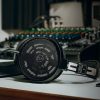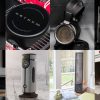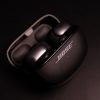A quick search of YouTube will reveal a lot of video reviews of Edifier and their lineup of powered loudspeakers; a number of them have been well received by consumers who have praised them for their affordable price and above average performance. The Edifier Neobuds S Noise Cancelling True Wireless Earbuds follow the same ethos but can they deliver in a category dominated by some very strong competition.
The reality is that Edifier is more than just a manufacturer of affordable powered speakers; founded in 1996, the brand has been manufacturing automotive audio, pro audio microphones, and other home entertainment products for almost 26 years. They were one of the first Chinese audio companies to be listed on the Chinese Stock Market (2010) and they remain one of the largest audio companies in China today.
They also own STAX Audio, having purchased the venerable Japanese brand in 2011. Lynn Miller will be reviewing the first STAX branded wireless headphones in Q3 so keep an eye out for that review. Edifier has huge plans for STAX in the N. American and European markets going forward.

Edifier’s lineup of IEMs and headphones under their own branding are targeted at the budget category and very much like their powered monitors, the Edifier Neobuds S Wireless Earbuds are very affordable at $179 USD.
Edifier also offers the Neobuds Pro wireless earbuds for $129 and they represent the entry-level model; the naming is somewhat peculiar but they don’t offer the same features or level of performance regardless of what “Pro” might suggest.
The $179 pricing puts the Edifier Neobuds S model up against some rather tough competition from the Sennheiser CX Plus, Sony Linkbuds, Shure Aonic Free, and Noble Falcon Wireless Earbuds; the Edifier really need to offer comparable features and performance to succeed in the rather crowded category.

The Skinny
The kit contains the earpieces and case, carry bag, a USB Type-C charging cable, and 6 sizes of tips along with the manual. The case is mid-sized with a single Large LED band on the front and charging port on the rear.
Similar to the “Pro” model, the case has a decorative metal inlay but the two are easy to tell apart as the Pro uses a silver inlay while the S uses a black inlay. The Neobuds S are only available in black.
The earpieces are a flattened stick bud with a mic at the tip of each stem and a large vent near the top. The underside of the stick has 2 contact points for charging and large L/R indicators for easy indexing. The drivers are housed in a small bulb at the top of the stick with the nozzle exiting at a steep downward angle.

Passive isolation is average and the design also lends itself to some movement during periods of strenuous exercise.
One upside is the IP54 waterproof rating; the Neobuds S are impervious to sweat and can withstand some exposure to water if you decide to run in the rain. They are unlikely to survive the washing machine test.
Edifier’s decision to include 6 sizes of tips was a wise one; I had very little difficulty finding the right size to create a good seal. The outer face of the stick acts as the touch control sensor and was somewhat finicky.
Internally, the Neobuds S use a composite diaphragm dynamic driver paired with a customized Knowles balanced armature that are bi-amped and backed by a DSP crossover that helps keep everything in balance.

This is backed by the Qualcomm Snapdragon Sound Bluetooth chipset and a lithium ion battery that gives the earpieces around 5 hours of playing time before requiring a charge in the case.
The Snapdragon support replaces LDAC support on the Pro model and offers true 24-bit/96kHz transfer rates, but there is a catch; the source has to support it too and right now, very few do.
The list on Qualcomm’s website shows a handful of Xiaomi, Nubia, Motorola, Asus, Vivo, ZTE, Sharp, and BlackShark models as currently certified to work with the latest Snapdragon sound protocol.
Conspicuously absent are Samsung, Sony, OnePlus, Google, and I think it is safe to assume apple won’t be adopting it anytime soon since it is offering its own competitive protocol.
For now, most Android users will have to settle for the fallback position of aptX Adaptive, while Apple devices will only connect via SBC. This may eventually prove to be a good thing because the Neobuds S are designed for future compatibility with the hi-res streaming protocol.
The omission of support for LDAC is likely to turn off some prospective buyers who are unlikely to view the support for Snapdragon as a benefit they are willing to wait for if they upgrade their source device. Consumers are very fickle.

The touch control is only the portion of the stem between the logo and the vent and it has a somewhat steep learning curve as the system uses single, double, and triple taps to cover a wide range of functions.
Most of the functions can be changed in the Edifier Connect app or the app can be used instead of the touch controls which is likely a better way to go. The app has several functions, but finding them is not always intuitive. On the main page, the charge status is displayed with 5 buttons beneath it that allow control of ANC and Ambient mode.



Swiping left changes the screen to the tuning options with two presets for “Classic” and “Dynamic” or a custom setting that has a 4 band parametric style EQ that allows selecting the root frequency and bandwidth for each band.
A second swipe left brings up the game mode which reduces latency and a fourth swipe brings up the control to change the case LED color. For this last page to work, the earpieces must be inside the charging case.
A second menu is available by clicking the nut at the top right which contains the ability to adjust the prompt volume, power off the earpieces, set the shutdown timer, adjust the touch controls, change the tap sensitivity, and the factory default settings.
There is not an option to check firmware availability so you have to wait until prompted for updates.

Battery
During my testing, I found that with ANC or Ambient mode engaged on the earbuds, they averaged around 5 hours from each charge.
Without ANC and at moderate volume levels, I could get close to 6 hours before needing to recharge. The charging case provides an additional 4 charges before needing to be plugged in and recharged.
The case does not support wireless charging. In a pinch, a 10 minute recharge of the earbuds nets about an hour of listening time so while the buds won’t make it through a workday without a recharge, you should be okay on the commute home.



Sound
Never allow yourself to be seduced by the marketing copy and that proved to be the case with the Edifier Neobuds S; despite the promises of bi-amping and DSP controlled active crossovers, the default sonic signature is “V” shaped and in a very pronounced way.
The sub-bass has good extension and definition; the roll-off is only detectable around 25Hz and the level of low end impact was quite sufficient with most genres of music.
The mid-bass is certainly pronounced and while it does offer a rather strong level of impact and is rather clean sounding, there is some bleed into the midrange and far more than I would prefer.
You can clean it up with the EQ which does help reduce the level of bleed and allows you to hear more of the lower midrange and the detail that the Neobuds S can deliver.
The mid-bass delivers fairly strong levels of detail and texture, but I wish that the decay was slightly faster which would help tighten up the upper bass and lower midrange.
As mentioned, the midrange is slightly recessed sounding, with the lower midrange being somewhat obscured by the level of bass bleed.
Once tuned to reduce the bass push, the midrange have a bit more presence in the mix and male vocals sound a bit less recessed. There is a rise in the midrange as you move further up and it does alter the tonal balance and presentation as you crossover into the lower treble.
Female vocals are rather forward sounding in the mix and I found myself using the EQ to reduce some of the excess energy in this part of the spectrum; poorly recorded music can come across with a degree of hardness if you don’t watch your volume levels.
The treble starts off with a big push in the lower treble range that balances against the substantial bass emphasis but then drops back fairly quickly and the overall top-end extension is only moderate. Percussion has good snap but cymbals are a bit underwhelming; they suffer from a lack of detail and airiness.
One of the big pluses is that the sound sculpting controls do work and don’t have a negative impact on the sound quality; although I do have serious doubts about the stated -42dB reduction in noise with ANC enabled.
The ANC certainly works and does not drop a veil over the sound which is quite common with other wireless IEMs; I was impressed with the “Ambient” mode that allowed voices to cut through so I was able to have a normal conversation with music playing in the background.
Phone call quality was certainly above average and I was able to have clear conversations with people and also not become distracted by the sound of my own voice which was never emphasized by the mics. I could hear myself quite clearly and there was more than sufficient clarity outside surrounded by external sources of noise.

Conclusion
The Edifier Neobuds S proved to be an interesting pair of wireless earbuds because they bring some solid features to the conversation; effective ANC, the ability to use EQ in a meaningful way that had a positive impact on the overall sound quality, Ambient mode, IP54 water and dust resistance, and support for Bluetooth aptX Adaptive.
The problem is that those same features are available in the less expensive Neobuds Pro ($129 at Amazon) and the biggest selling feature of the Neobuds S isn’t widely available in source devices yet.
The ability to use the Snapdragon protocol for true 24-bit/96kHz wireless streaming is a fantastic feature but until it is supported by the 3-4 brands that sell 90% of the wireless devices — it’s not moving the needle for most consumers.
If you are fine with the sonic signature, the Edifier Neobuds S Wireless Earbuds are a rather forward thinking pair of IEMs that might prove to be the right model for you.
Where to buy: $179.99 at Edifier.com | Amazon.co.uk

































